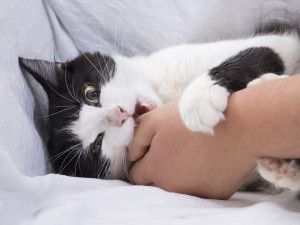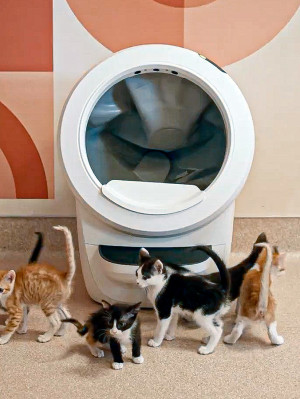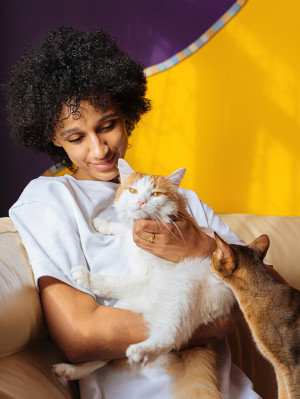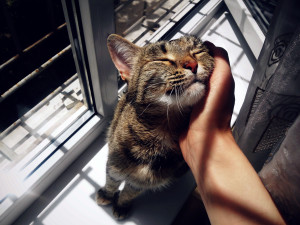How to Train a Kitten Not to Bite
Hey, put those chompers away.

Share Article
In This Article:
Why Is My Kitten Biting Me? How Do You Train a Kitten Not to Bite? Effective Ways to Train a Kitten Not To Bite How to Play with a Kitten Appropriately Frequently Asked Questions
Kittens, like most baby animals, are adorable, and you can’t help but want to pick them up and snuggle them. Unfortunately, you may get bitten for your trouble — with razor-sharp teeth. Not to mention those random attacks when your kitten jumps on you, teeth-first.
How do you train a kitten not to bite and save your fingers from constant pain? Unfortunately, biting is a natural cat behavior, but there are still ways you can gently discourage your kitten from biting through socialization, proper playtime, and positive reinforcement techniques. Learn how to stop your kitten from biting with these kitten training tips for biting.
Why is my kitten biting me?
Why is my kitten biting so much? Biting for cats is a natural behavior, and they may break out those teeth when you’re playing, holding them, or even just while cuddling. Cats are predators, and biting keeps them safe and helps them survive in the wild. Training a kitten not to bite, though, can be essential for keeping you and your new pet happy.

“Kittens bite for several reasons,” certified cat behaviorist Marci Koski says. “When they’re learning to explore their environment, they use their mouth and teeth to bite, taste, and chew on things to evaluate various objects they encounter. They also bite during play and while building social relationships (for example, to test boundaries).”
Just like other baby animals, kittens bite to explore and understand their world. They may also bite more when teething to ease their gums and growing teeth or may continue to bite when not fully weaned. Some kittens bite during playopens in new tab, a behavior that comes from their natural hunting instincts.
How do you train a kitten not to bite?
As your kitten grows and matures, they usually will stop biting as frequently, but it’s still important to address any negative behaviors to avoid issues in adulthood. If you’re looking for how to train a kitten to not bite or scratch, start with understanding what not to do:
Never use physical punishment on your kitten.
Don’t yell, scold, or use loud noises as a deterrent.
Don’t use a spray bottle or other methods designed to startle.
Never push your kitten away with force.
“The best thing to do if your kitten is biting you (particularly with play) is to not use your hands to engage your kitten in play,” Koski says. “Always use a toy instead. This way, your kitten will not see hands or feet as play objects to be bitten in the first place.”
Effective ways to train a kitten not to bite
While biting is a natural kitten behavior, it’s undesirable in many ways — especially for your poor fingers! Fortunately, there are steps you can take to train a kitten not to bite and encourage them toward more appropriate play. (And yes, you can train a cat.)
”If your kitten is biting you to seek attention, get up and walk away,” Koski says. “The message should be that if the kitten uses their teeth, they get no attention (the opposite of what they want). If you know your kitten is looking for attention, give it to them before they resort to biting.”
Positive reinforcement and redirection
When your kitten starts biting, direct their attention to an appropriate toy, instead of yelling or scolding. Consistent, positive reinforcement is the best way to change your kitten’s behavior and help them understand that biting isn’t the best way to play.
Encourage socialization with playmates
If you can, adopt more than one kitten so they have a proper playmate or find opportunities for socialization with other young cats. By playing with others, your kitten can learn play appropriate behavior and get out their energy in a productive way, through natural behaviors like pouncing and tackling.
Provide suitable toys for chewing
Try not to use your hands as toysopens in new tab, which can lead your kitten to view your fingers as playthings. Instead, offer your kitten a variety of toys, such as balls, throw toys, wands, scratching posts, and interactive toys. The more variety, the more easily you can keep your kitten engaged in appropriate play — and keep your hands away from those sharp, little teeth.
Consult an expert
If biting remains a persistent issue or causes harm, it may be a sign that something deeper is going on. Consider reaching out to your vet or consulting a cat behaviorist for guidance on next steps.
How to play with a kitten appropriately
Avoid encouraging your kitten to bite by playing appropriately with toys designed for kitten enrichmentopens in new tab. Try to throw toys away from you to allow your kitten to chase and pounce on them and look for toys which have spaces to place treats inside, providing your kitten mental stimulation. Set time aside each day to play with your kitten and make sure to offer a variety of toys to keep them entertained and engaged.
FAQs (People also ask):
Why does my kitten bite me?
Like many young animals — and even human babies — kittens use their mouths and bite to explore the worldopens in new tab around them.
How can I teach my kitten to play gently?
Encourage your kitten to play with appropriate toys. If possible, plan socialization and playtime with other kittens to learn gentle playopens in new tab.
References:

Savannah Admire
Savannah Admire is a writer and pet mom to two dogs and a cat. Under the name Savannah Cooper, she has published poetry in 40 different publications, as well as a poetry book, Mother Viper (2025). When she’s not writing, you can find her reading, taking photos, or volunteering as a content creator for her local community theatre. As a pets writer, she focuses on cat and dog behavior and pet parenthood. She currently lives in Western Maryland.
Related articles
![Woman playing at home with her kitten.]()
How to Train Your Cat: Tips and Cues for Kittens
Seriously, it’s not as hard as you think.
![Cat sitting in a teal litter box]()
How to Train a Cat to Use a Litter Box
If you do nothing else, teach your cat to poop in their litter box (not your shoe).
![Kittens and the Litter Robot kitty litter box.]()
The Best Litter Boxes for Kittens in 2026
Help your little one learn the ropes.
![Woman playing with her cat.]()
Your Cat Really Wants You to Play With Them—Here’s How
It’s the key to a happy cat.
![A woman with curly black hair sitting in front of a dark purple and yellow backdrop while looking down affectionately at her two cats sitting on her lap]()
How to Build Your New Cat’s Trust in You
If your cat still approaches you with a figurative arched eyebrow of skepticism, try these tricks to put them at ease.
![Cat being happily pet in the sunshine of a window]()
How to Pet a Cat (Without a Scratch)
There is a right and wrong way.







